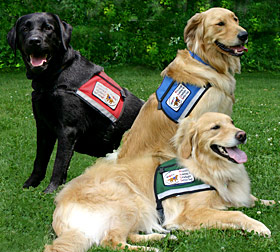Service Animal vs. Support Animal
Service Animal vs. Support Animal
Such a hot button topic in the disability services world. A student shows up to class carrying a tiny dog in their bag. It's barking, it's disruptive. Professor asks the student to remove the dog from the classroom. The student tells the professor it is a 'service animal'. Now what do you do?
First, learn the difference between the two. A Service animal can only be a dog, any size. There are guide dogs, hearing/signal dogs, psychiatric dogs, sensory/social signal dogs or seizure response dogs. A Service animal can also be a miniature horse, but there are further regulations for mini-horses.
"Emotional support animals, comfort animals, and therapy dogs are not service animals under Title II and Title III of the ADA. Other species of animals, whether wild or domestic, trained or untrained, are not considered service animals either. The work or tasks performed by a service animal must be directly related to the individual’s disability. It does not matter if a person has a note from a doctor that states that the person has a disability and needs to have the animal for emotional support. A doctor’s letter does not turn an animal into a service animal." - ADATA, 2014
As for emotional support animals:
"An emotional support animal is a companion animal that provides therapeutic benefit to an individual with a mental or psychiatric disability. The person seeking the emotional support animal must have a verifiable disability (the reason cannot just be a need for companionship). The animal is viewed as a "reasonable accommodation" under the Fair Housing Amendments Act of 1988 (FHA or FHAct) to those housing communities that have a "no pets" rule. In other words, just as a wheelchair provides a person with a physical limitation the equal opportunity to use and enjoy a dwelling, an emotional support animal provides a person with a mental or psychiatric disability the same opportunity to live independently." - AnimalLaw.info
So what can be an emotional support animal?
"All domesticated animals may qualify as an ESA (cats, dog, mice, rabbits, birds, snakes, hedgehogs, rats, mini pigs, ferrets, etc.) and they can be any age (young puppies and kittens, too!). These animals do not need any specific task-training because their very presence mitigates the symptoms associated with a person's psychological/emotional disability, unlike a working service dog. The only requirement is that the animal is manageable in public and does not create a nuisance in or around the home setting."- NSARCO
To clarify if the animal is a Service dog or an emotional Support dog, you are only allowed to ask TWO clarifying questions.
1. Is this dog a service animal required because of a disability?
2. What work or task has the dog been trained to perform?
Essentially, is this a service dog and what does it do for you?
Next, it is best to understand what you can and cannot do when you find yourself in some gray area. Understand service dog certification can easily be replicated and sold online. 'Service Animal' harnesses and vests are also sold online. Whether you are working at a restaurant or you are teaching a class, you cannot ask for documentation or proof of certification - that is illegal.
"A public entity or private business may not ask about the nature or extent of an individual’s disability or require documentation, such as proof that the animal has been certified, trained or licensed as a service animal, or require the animal to wear an identifying vest." - ADATA, 2014
If the animal is being disruptive, or behaves in a way that poses a direct threat to the health or safety the service animal can be excluded or restricted from an area. Here are some more tips about service animal exclusions:
"The ADA does not require covered entities to modify policies, practices, or procedures if it would “fundamentally alter” the nature of the goods, services, programs, or activities provided to the public. Nor does it overrule legitimate safety requirements. If admitting service animals would fundamentally alter the nature of a service or program, service animals may be prohibited. In addition, if a particular service animal is out of control and the handler does not take effective action to control it, or if it is not housebroken, that animal may be excluded." - ADA, 2015









